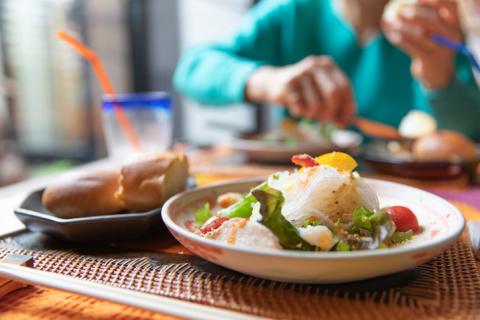Family Caregivers Should Consider Their Own Nutritional Needs
Most years, November is a time that we’re thinking about food as prepare to come together with family for Thanksgiving, Christmas, Hanukkah and other celebrations. But this year, even though many families will skip those celebrations, they should still talk about food. Most everyone knows that seniors face nutritional challenges—but we’re much less aware that caregivers do, too. They might not have time to prepare nutritious meals and snacks. Some are facing greater-than-usual economic uncertainty. Many are so stressed and anxious that they have no appetite.
“Caregiving can take its toll on caregiver nutrition,” confirms the U.S. Administration for Community Living (ACL). “While caregivers are often rightfully focused on making sure they provide healthy meals for those they care for, it is very important for caregivers to keep their own nutrition and hydration at the top of their priority list.”
The ACL reports that even as they ensure their loved one has nutritious meals and snacks, busy caregivers often just grab whatever’s on hand when they’re hungry. This often means sweets, fast food and other nutrient-poor foods that require little preparation or advance planning. Their diet might be high in calories and fat, but low on vitamins, minerals and protein.
The ACL notes that this can lead to malnutrition—and malnutrition increases stress all the more. This is a cycle to avoid! The good news is that caregivers can develop habits that improve their diet and aren’t terribly pricey or time-consuming. Here are three tips:
Make every calorie count. Choose nutrient-dense foods that provide lots of vitamins, minerals, and fiber. The main types of food in this eating pattern include a variety of vegetables (including dark green, red, and orange vegetables; beans and peas; and starchy vegetables like corn); fruits; whole grains; fat-free or low-fat dairy; seafood, poultry, meat, and eggs; and nuts, seeds, and soy products.
Focus on protein. This key nutrient builds muscles and bones, and protects our health in many ways. Include a protein such as fish, chicken, beef or eggs with every meal—or, plant-based protein such as nuts, beans and tofu. When you snack, choose protein-rich foods such as cheese, nuts, hard boiled eggs or peanut butter. Greek yogurt and other low-fat dairy products are also good. If your loved one drinks a liquid supplement, you might try that yourself!
Don’t forget hydration. Caregivers can be so busy that they forget to take in enough fluids. Be sure to drink a beverage at each meal, and 2 – 3 times between meals. Water is a perfect fluid. Milk, juice and other non-sweetened drinks are also good. Avoid sugary sodas.
It’s important to remember that many family caregivers today may have health challenges of their own. Our longer lifespan means many are of any age that they might need some care themselves. Meeting their own nutritional needs is just as important as being sure their loved one is eating well.
